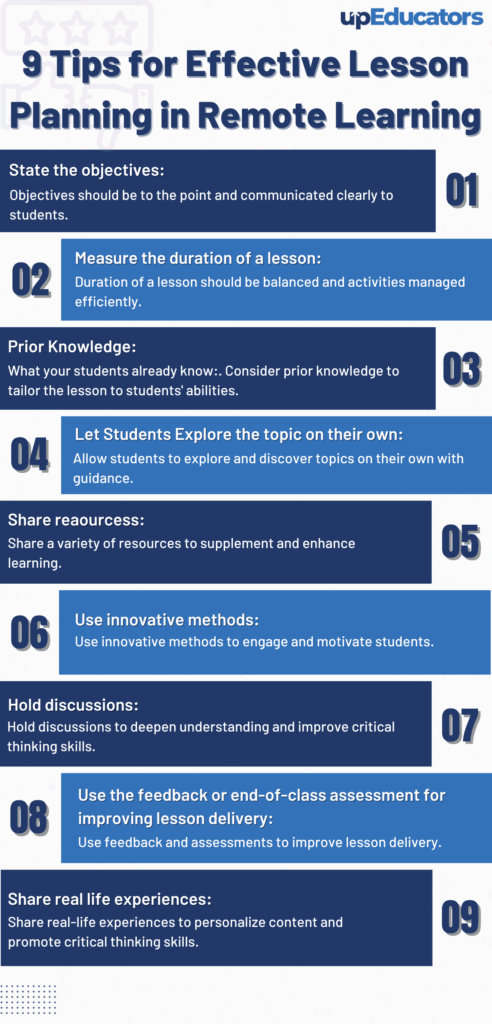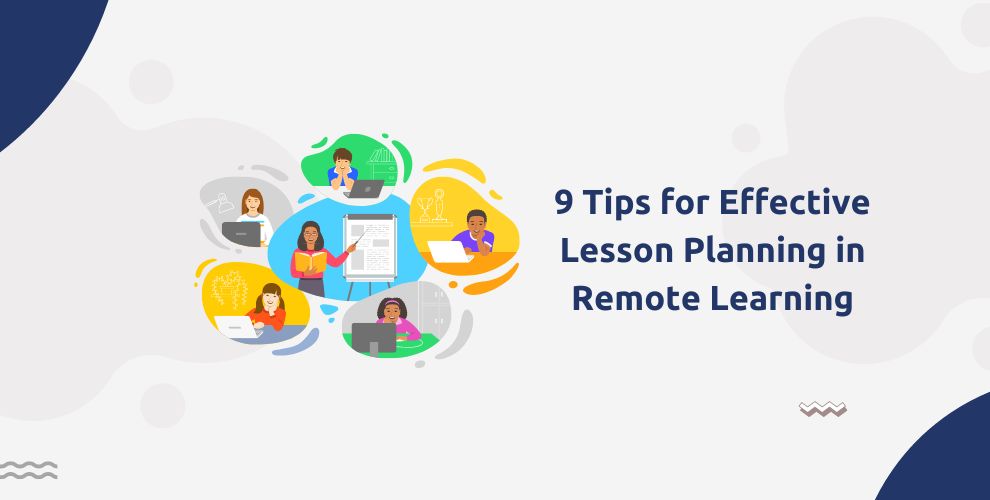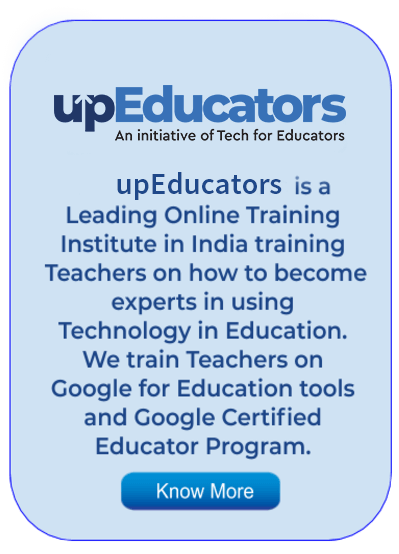A seventh-grade teacher was struggling to adapt to remote teaching. She had always been a traditional, in-person instructor, and found it difficult to engage her students through the computer screen. One of the main reasons for her struggles was her lack of experience in creating effective lesson plans for a remote classroom.
Her lesson plans were primarily focused on lectures and worksheets, with little to no interactive activities or opportunities for student participation. As a result, her students became disengaged and struggled to stay focused during class. Many of them would frequently mute their microphones and multitask, making it difficult for her to gauge their understanding of the material.
The teacher’s struggles with remote teaching highlight the importance of understanding how to create effective lesson plans for a remote classroom.

upEducators has trained 10,000+ educators in using digital tools and skills. After interacting with hundreds of teachers, our team has found some effective tips for enhancing lesson planning. Let us look at these tips for effective lesson planning.
State the Objectives
Stating clear objectives is the first step in effective lesson planning for remote learning. Objectives provide a clear focus for the lesson and ensure that the learning activities align with the overall goals of the course. They also provide a way for both the teacher and students to measure progress and assess learning.
Objectives should be SMART (specific, measurable, achievable, realistic and timebound) and should be communicated to the students in a clear and concise manner. This will help students to understand what they will be learning, as well as what is expected of them.
Measure the duration of a lesson
When planning a lesson, it is important to consider the length of time that will be spent on each activity or task. For example, a teacher may spend 20 minutes on a direct instruction activity, 15 minutes on a group discussion, and 10 minutes on independent practice. By breaking down the lesson into smaller chunks of time, the teacher can better manage the flow of the lesson and ensure that each activity is given the appropriate amount of time.
Additionally, it is important to consider the overall length of the lesson. While a longer lesson may seem like a good idea in order to cover more material, it can be overwhelming for students who are participating in remote learning. On the other hand, a shorter lesson may not provide enough time for students to fully engage with the material. Therefore, it is important to find a balance between the length of the lesson and the amount of material that will be covered.
Prior Knowledge: What your students already know
One of the most important factors to consider when creating a lesson plan is the current understanding or prior knowledge of the students on the subject. This is important because it allows the teacher to tailor the lesson to the needs and abilities of the students, rather than assuming that all students have the same level of knowledge.
By assessing the students’ prior knowledge, the teacher can identify gaps in understanding and address them in the lesson. This can be done through pre-assessments, such as quizzes or discussions, or by simply observing the students as they work on related tasks.
Let Students Explore the topic on their own
To create an effective lesson plan that incorporates constructivism, teachers can design activities that allow students to explore and discover the topic on their own. For example, hands-on projects, investigations, and inquiry-based learning activities can be used to provide opportunities for exploration and discovery. Additionally, teachers can also provide guidance and support through open-ended questions, prompts, and feedback.
Allowing students to explore the topic on their own and providing guidance rather than giving them all the answers is an effective approach to creating an effective lesson plan. This constructivist approach helps students to actively engage with the material, develop their own understanding, and make connections to prior knowledge, leading to deeper and more lasting learning.
Share Useful Resources
Sharing useful resources with students is an important aspect of creating an effective lesson plan. Resources can include a wide range of materials such as textbooks, online articles, videos, and interactive activities. These resources can help to supplement and enhance the learning experience, providing students with additional information, perspectives, and examples.
One of the key benefits of sharing resources with students is that it allows them to explore the topic in greater depth. For example, providing access to online articles, videos, and interactive activities can help students to gain a more comprehensive understanding of the subject matter. Additionally, resources such as primary sources, case studies, and real-world examples can provide students with a more authentic and engaging learning experience.
Use Innovative Methods
An effective lesson plan is one that is tailored to meet the needs and learning styles of students, and that is designed to engage and motivate them to learn. To accomplish this, teachers must use innovative methods and tools that are based on current research and best practices in education.
One such method is the use of technology in the classroom. This can include the use of interactive whiteboards, tablets, and other digital tools to enhance student engagement and to provide opportunities for collaboration and problem-solving.
Another innovative approach is the use of project-based learning. This method allows students to apply what they have learned to real-world problems and projects, which can be more engaging and motivating than traditional lecture-based instruction. Teachers can also use problem-based learning, where students learn by actively engaging in the process of solving real-world problems.
Hold Discussions
Holding discussions in the classroom is a crucial part of effective lesson planning as it allows students to actively engage with the material, express their own thoughts and ideas, and hear the perspectives of their peers. This can help to deepen their understanding of the subject matter and improve their critical thinking and communication skills. This in turn can provide teachers with useful insights to create lesson plans.
Use the feedback or end-of-class assessment for improving lesson delivery
Providing feedback or end-of-class assessments and using feedback tools are important in remote learning to ensure that students are understanding the material and adjust lesson plans accordingly. This can help create a more effective learning experience for students.
Share Real Life Experiences
Sharing real-life experiences in the classroom can help in effective lesson planning in several ways. Firstly, it personalizes the content for students and makes the material more relatable and engaging. This can help increase student interest and motivation to learn. Secondly, it can serve as a rich source of examples and case studies that can bring abstract concepts to life and help students understand them in a more concrete manner. Furthermore, sharing personal experiences can also promote critical thinking and problem-solving skills, as students are encouraged to reflect on and analyze real-world scenarios. This can enhance their ability to apply the theories and principles they learn in the classroom to real-life situations.
Effective lesson planning is a key component of effective teaching. It requires careful consideration of the student’s needs, learning styles, and interests, as well as the use of a variety of teaching methods and strategies. Setting clear and measurable objectives, incorporating interactive activities and hands-on learning, utilizing technology and digital tools, and providing feedback and using feedback tools are all important elements of effective lesson planning. By following these tips, teachers can create lesson plans that are engaging and meaningful for their students, and help them to achieve their full potential. If you want to learn effective lesson planning, then upEducators offers great insights and training for lesson planning to teachers through the Professional Certificate in Innovative Teaching Practices course for teachers.
Author: This article is written by Samiya Rashid for upEducators blog.




